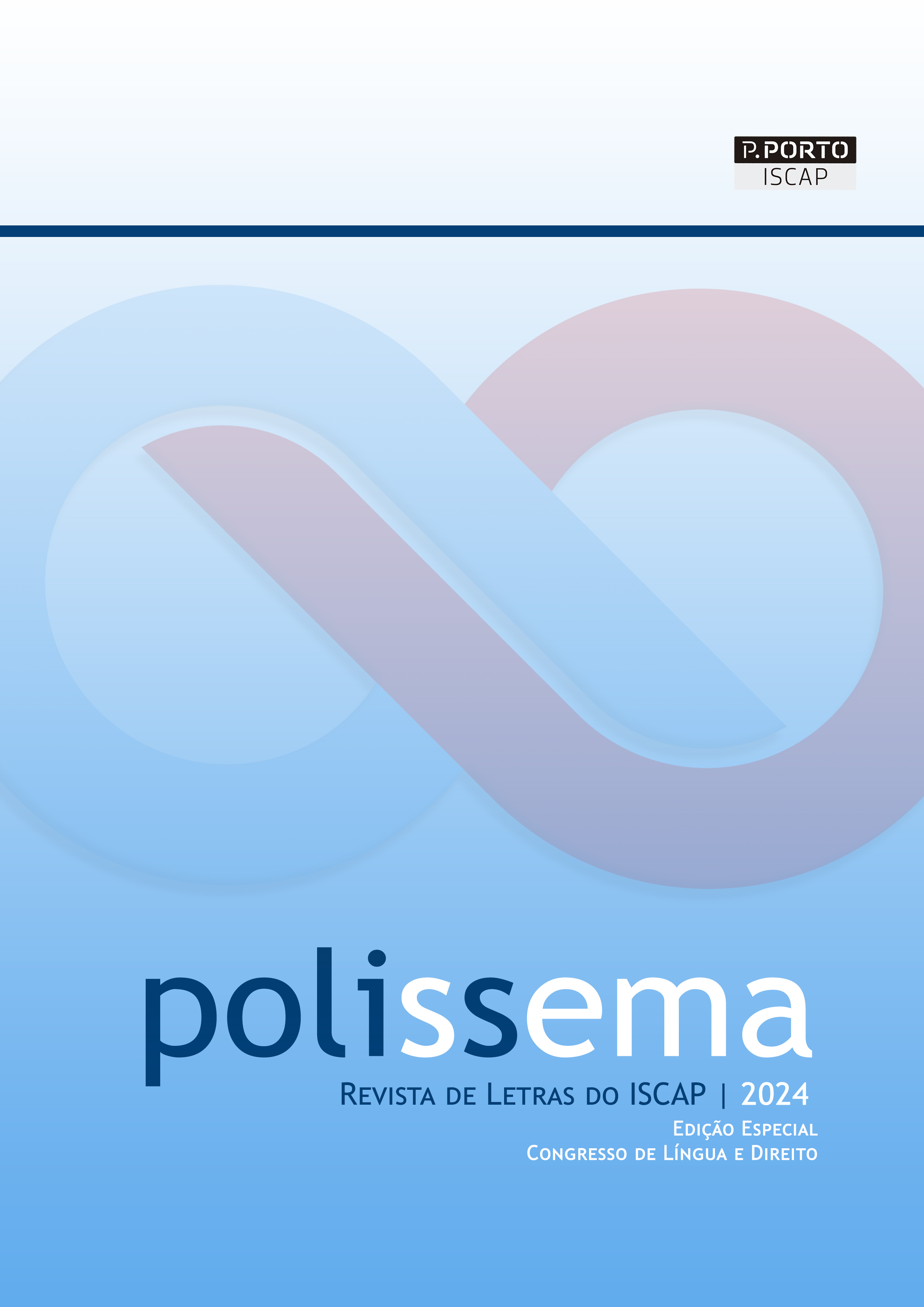CRIME VICTIMS’ RIGHT TO INFORMATION: PLAIN LANGUAGE AND ITS IMPLEMENTATION
DOI:
https://doi.org/10.34630/polissema.vi.5764Palabras clave:
victims of crime, right to information, communication safeguards, plain languageResumen
The thorough fulfilment of crime victims' right to receive information presents itself as one of the crucial means to ensure that those suffering from the consequences of a criminal offense have the opportunity to enforce their remaining rights. Directive 2012/29/EU, concerning the rights of victims of crime, acknowledged this by assigning central relevance to this prerogative. It did so, namely, by establishing the obligation for Member States to ensure that communication with victims is conducted in simple and accessible language. Portugal, in this regard, has set forth in article 12, No. 2, of the Victim's Statute, the duty to provide information to victims in intelligible language, considering their personal characteristics. However, throughout the European Union, it remains clear that information is conveyed in language that is not simple, nor easy to understand.
Employing both hermeneutic and empirical methods, our aim is to, on the one hand, study the main provisions of European Union and national legislation that enshrine this right, and on the other hand, diagnose the primary issues concerning the effectiveness of how information is currently communicated to crime victims, clarify and specify what constitutes "plain language" as a communication technique to efficiently transmit information, consider existing best practices, and analyse the potential implementation of these and other best practices within law enforcement and judicial authorities.
Citas
APAV – Associação Portuguesa de Apoio à Vítima (2015a). Posição da APAV relativa à Lei n.º 130/2015, de 4 de Setembro, que procede à 23.ª alteração ao Código de Processo Penal e aprova o Estatuto da Vítima. https://shorturl.at/djMW5.
APAV – Associação Portuguesa de Apoio à Vítima (2015b). Para um Estatuto da Vítima em Portugal: direitos mínimos das vítimas de todos os crimes; Contributo da APAV para a transposição da Directiva da EU sobre direitos, apoio e proteção das vítimas. https://apav.pt/apav_v3/images/pdf/APAV_Directiva.pdf.
APAV – Associação Portuguesa de Apoio à Vítima (2019). Vociare National Report. https://shorturl.at/orH28.
Australian Government (2023). Style Manual. https://shorter.me/dN-9O.
Boyd, A. (2019). Clarity in the code du travail: the plain language movement, French legislative drafting, and President Macron's collective bargaining reform. Penn State Journal of Law and International Affairs, 7(1), 263-303. https://elibrary.law.psu.edu/jlia/vol7/iss1/23/.
Buczma, S. (2013). An overview of the law concerning protection of victims of crime in the view of the adoption of the Directive 2012/29/EU establishing minimum standards on the rights, support and protection of victims of crime in the European Union, ERA Forum, 14, 235–250. https://doi.org/10.1007/s12027-013-0305-0.
Directive 2012/29/EU of the European Parliament and of the Council of 25 October 2012 establishing minimum standards on the rights, support and protection of victims of crime, and replacing Council Framework Decision 2001/220/JHA (2012). https://shorter.me/xoARA.
Directive on the Management of Communications (2016). https://shorter.me/Sfj2N.
Ehrenberg-Sundin. B. (2004). Plain Language in Sweden, the Results After 30 Years. https://www.plainlanguage.gov/resources/articles/plain-language-in-sweden/.
European Commission (2020). Report from the Commission to the European Parliament and the Council on the implementation of Directive 2012/29/EU of the European Parliament and of the Council of 25 October 2012 establishing minimum standards on the rights, support and protection of victims of crime, and replacing Council Framework Decision 2001/220/JHA. https://shorter.me/3W6oL.
European Commission (2022a). Proposal for a Directive of the European Parliament and of the Council on combating violence against women and domestic violence. https://shorter.me/wAMNW.
European Commission (2022b). Commission Staff Working Document - Evaluation of Directive 2012/29/EU of the European Parliament and of the Council of 25 October 2012 establishing minimum standards on the rights, support and protection of victims of crime, and replacing Council Framework Decision 2001/220/JHA. https://shorter.me/OgKlf.
European Commission (2023). Proposal for a Directive of the European Parliament and of the Council amending Directive 2012/29/EU establishing minimum standards on the rights, support and protection of victims of crime, and replacing Council Framework Decision 2001/220/JHA. https://shorter.me/YAJgX.
“Infovictims” project (2022). https://infovictims.com/.
International Plain Language Federation (2024). Plain Language Definitions. https://www.iplfederation.org/plain-language/.
Kimble, J. (1994-1995). Answering the Critics of Plain Language. Scribes Journal of Legal Writing, 5, 51-86. https://heinonline.org/.
Lei n.º 112/2009, de 16 de setembro (2009). https://diariodarepublica.pt/dr/detalhe/lei/112-2009-490247.
Lei n.º 130/2015, de 4 de setembro. (2015). https://diariodarepublica.pt/dr/detalhe/lei/130-2015-70186239.
Maguire, M. (1991). The Needs and Rights of Victims of Crime. Crime and Justice, 14, 363-433. https://www.jstor.org/stable/1147465.
Plain Language Act. (2022). https://shorter.me/G_Pyf.
Plain Writing Act. (2010). https://shorter.me/VFnMu.
Portaria n.º 229-A/2010, de 23 de abril. (2010). https://shorter.me/XFfOh.
Portaria n.º 138-E/2021, de 1 de julho. (2021). https://shorter.me/A4EKm.
Protocolo entre o Ministério da Justiça e a Procuradoria-Geral da República (2019). https://shorturl.at/ijJT8.
Stephenson, M. (2017). 'Harry Potter language?" The Plain Language Movement and the case against abandoning 'legalese'. Northern Ireland Legal Quarterly, 68(1), 85-90. https://doi.org/10.53386/nilq.v68i1.24.
Tiersma, P. M. (2006). Some myths about legal language. Law, Culture and the Humanities, 2(1), 29-50. https://doi.org/10.1191/1743872106lw035oa.
United States Government (2011). Federal Plain Language Guidelines. https://www.plainlanguage.gov/media/FederalPLGuidelines.pdf.
Victim Support Europe (2019). Vociare Synthesis Report. https://shorturl.at/jpDEZ.
Victim Support Europe (2022). Transforming how we communicate with victims – Moving beyond information provision to a system of communication. https://shorturl.at/ewGV7.
Descargas
Publicado
Cómo citar
Número
Sección
Licencia
Derechos de autor 2024 POLISSEMA – Revista de Letras do ISCAP

Esta obra está bajo una licencia internacional Creative Commons Atribución-NoComercial-SinDerivadas 4.0.


